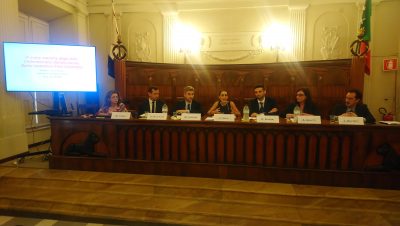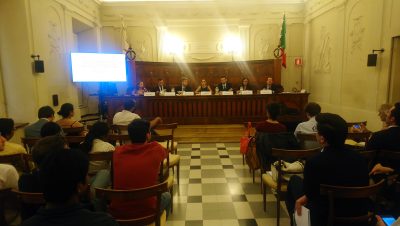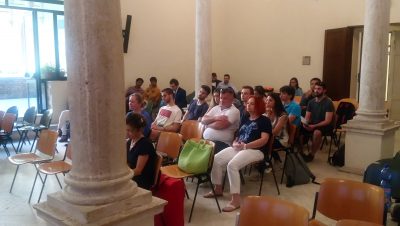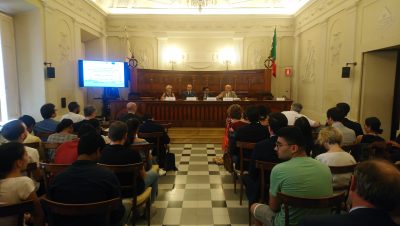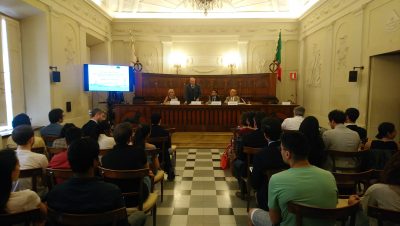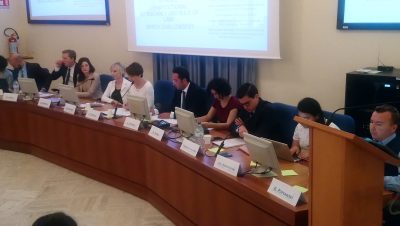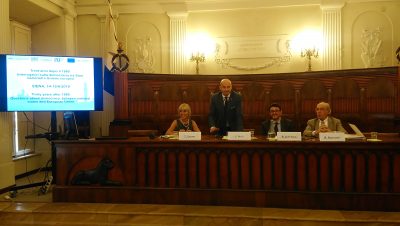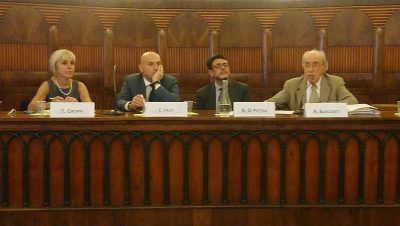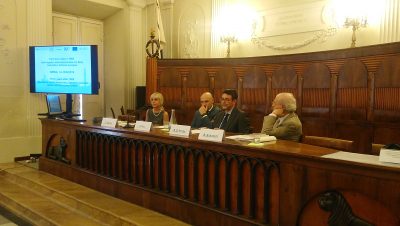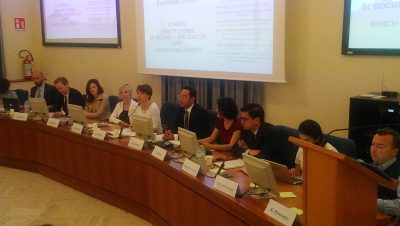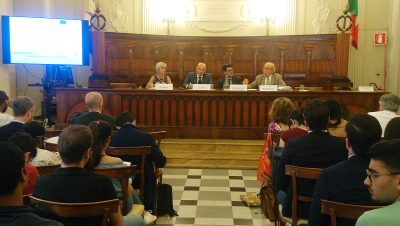WORKSHOP FOR YOUNG SCHOLARS ON THE IMPACT OF EU LAW ON NATIONAL CONSTITUTIONS
Trent’anni dopo il 1989. Interrogativi sulla democrazia tra Stati nazionali e Unione europea.
Thirty years after 1989. Questions about democracy, between national States and European Union.
(14-15 giugno 2019)
CALL FOR PAPERS ITA / CALL FOR PAPERS EN
Il workshop intende affrontare i principali nodi problematici della democrazia in Europa, a trent’anni di distanza dal 1989, in un momento storico in cui i benefici della democrazia sono messi sempre più in discussione dalla nascita, in seno alla stessa Unione europea, di regimi non democratici e dal crescente successo elettorale di movimenti politici che si richiamano a esperienza non democratiche. In particolare, nell’ambito della democrazia costituzionale, costruita intorno ai due circuiti della sovranità popolare e del rule of law costituzionale, sembra in grande difficoltà il circuito della decisione politica, nel quale la partecipazione all’adozione delle decisioni era stata risolta attraverso il principio della rappresentanza politica. Ciò è evidente dal livello di sfiducia nei partiti e dal tasso di partecipazione al voto, soprattutto dei giovani. Sembra che un numero crescente di cittadini ritenga inutili le elezioni, i partiti, la politica, in un’epoca in cui le decisioni che incidono sulla vita concreta delle persone avvengono a livello globale e sono in gran parte nelle mani del mondo dell’economia e della finanza. È in questo contesto che emergono i fenomeni populisti, ovvero movimenti che sostengono di voler “ridare lo scettro al principe”, affermando di parlare in nome del popolo, come se il popolo fosse uno e avesse una volontà: da qui la negazione della mediazione e del compromesso, che sono al cuore della democrazia rappresentativa, e la richiesta che il popolo si esprima direttamente (preferibilmente con un sì o un no).
Una riflessione sulla realtà di questa situazione, sulle sue cause e sulle possibili risposte sembra opportuna e attuale. Si intende, a tal fine, organizzare un workshop in cui esperti della materia e giovani studiosi si confrontino, alla luce del diritto costituzionale e del diritto europeo, ma prendendo altresì in considerazione altri punti di vista, come quello della scienza politica e della sociologia.
Il workshop sarà articolato in tre panel, che ospiteranno le relazioni di esperti provenienti da università italiane e straniere e nell’ambito dei quali si invitano giovani studiosi a presentare comunicazioni, sulla base delle linee tematiche indicate qui di seguito. In tutti e tre i panel saranno apprezzate anche proposte finalizzate ad analizzare il substrato che costituisce il necessario humus della democrazia (rappresentativa, partecipativa, costituzionale): ovvero il substrato sociale, che può essere definito in termini di “capitale sociale”, “cultura del dialogo”, “virtù civiche”, all’origine di quello che Norberto Bobbio chiamava lo “spirito democratico”.
Il workshop si svolge nell’ambito del modulo Jean Monnet EUCOLAW – The Europeanization of Constitutional Law. The Impact of EU Law on national sources of law, form of government, rights and freedoms (coordinatrice prof.ssa Tania Groppi).
The workshop deals with the main difficulties related to democracy in Europe, thirty years after 1989. We are at an historic turning point, in which the benefits of democracy are increasingly questioned by the birth, inside the European Union itself, of non-democratic regimes and by the growing electoral success of political movements relying on non-democratic experiences. Within the constitutional democracy, which is built around the two pillars of the popular sovereignty and the constitutional rule of law, the political decision circuit is especially under pressures: a system in which the participation to the adoption of decisions had been settled through the political representation principle. This is pretty evident from the growing level of distrust in political parties and from the decreasing participation rate in vote, especially among young people. It seems that an increasing number of citizens considers elections, parties and politics useless, in a time in which the decisions affecting people’s real life are more and more taken at a global level and they are mostly in the hands of economics and finance. This is the context in which populist phenomena arise, namely movements stating that they want to “give back the sceptre to the prince”, claiming to talk in the name of the people, like this last was one and it had a single will: from there, the denial of mediation and compromise, which are at the heart of representative democracy and the demand for the people to express in a direct way (preferably with a yes or no).
A reflection on the reality of that situation, on its causes and on its possible answers seems appropriate and topical. For that reason, the aim is to organise a workshop in which experts and young researchers can discuss about the topic, in the light of constitutional and European law, by also taking into consideration other points of view, such as the political science and the sociology ones.
The workshop will be divided in three panels, focused on the reports of experts coming from Italian and European universities and within which young scholars are invited to present papers following the guidelines set out below. Proposal aiming to analyse the substrate constituting the necessary humus of democracy (representative, participative, constitutional) are also welcome in all the panels, namely proposals concerning the social substrate, definable in terms of “social capital”, “culture of dialogue”, “civic virtues”, at the origins of what Norberto Bobbio used to call “democratic spirit”.
The workshop is held within the Jean Monnet module EUCOLAW – The Europeanization of Constitutional Law. The Impact of EU Law on national sources of law, form of government, rights and freedoms (coordinator Prof. Tania Groppi)
Le sfide al processo di integrazione europea e alla democrazia costituzionale nel XXI secolo
The Challenges to the European Integration Process and the Constitutional Democracy in the XXI Century
15/16-6-2018
Gli ordinamenti costituzionali dei Paesi europei sono interessati, a partire dalla seconda decade del XXI secolo, da una serie di sfide che sollevano problemi importanti tanto al processo di integrazione europea quanto alla tenuta della forma di Stato della democrazia costituzionale. Le crisi vissute nel continente negli ultimi anni, in primis quella migratoria e quella economica, hanno innescato delle risposte spesso difficilmente conciliabili con i valori dello Stato costituzionale di diritto, altresì riconosciuti dal Trattato dell’Unione europea come valori fondamentali dell’Unione.
Lo scopo del workshop è quello di riflettere sulle sfide poste da tali fenomeni alla democrazia costituzionale e al processo di integrazione europea. A tal fine, si inviato i dottori di ricerca e i dottorandi che hanno svolto o che svolgono il loro percorso formativo nell’ambito del dottorato in Diritto pubblico comparato dell’Università di Siena a presentare le proprie riflessioni sul tema del workshop. L’evento è anche un’occasione per festeggiare i venti anni del corso di dottorato, che tradizionalmente si occupa proprio di studiare le tematiche relative ai caratteri e al funzionamento dello Stato costituzionale.
Il workshop si svolge nell’ambito del modulo Jean Monnet EUCOLAW – The Europeanization of Constitutional Law. The Impact of EU Law on national sources of law, form of government, rights and freedoms (coordinatrice prof.ssa Tania Groppi).
The constitutional orders of the European States have been affected, from the second decade of the XXI Century, by a number of challenges which raise important problems connected both to the European integration process and the functioning of the constitutional democracy form of State. The crisis lived by the continent in the recent years, first and foremost the migratory and the economic ones, have often brought to answers not easily compatible with the values of the Constitutional State, which have also been recognised in the Treaty of European Union as fundamental values of the Union.
The aim of the workshop is to reflect on the challenges posed by these phenomena to the constitutional democracy and the European integration process. For this purpose, the PhDs and the PhD candidates who spent a part of their educational program in the context of the PhD in comparative public law in Siena are invited to present their reflections on the topic of the workshop. This event will also be the occasion to celebrate the twenty years of the PhD course, which is traditionally focused on the issues related to the characters and the functioning of the Constitutional State.
The workshop is held within the Jean Monnet module EUCOLAW – The Europeanization of Constitutional Law. The Impact of EU Law on national sources of law, form of government, rights and freedoms (coordinator Prof. Tania Groppi).
Unione europea, Stati e cittadini. Tra antieuropeismo e condizionalità
European Union, States and Citizens. Between Anti-Europeanism and Conditionality
22/23-6-2017
CALL FOR PAPERS ITA / CALL FOR PAPERS EN
Le relazioni tra Unione europea, Stati e cittadini stanno conoscendo, nel periodo attuale, una rapida evoluzione e una serie di sfide impegnative. Da una parte, l’antieuropeismo si sta diffondendo tanto nella società, quanto nella comunità politica; dall’altra, la condizionalità europea sta crescendo, soprattutto nel settore della governance economica e finanziaria, mentre fatica ad affermarsi in altri ambiti, come quello del rispetto della rule of law. Una riflessione su questi temi sembra opportuna e attuale.
Si intende, a tal fine, organizzare un workshop in cui esperti della materia e giovani studiosi propongano analisi su alcune tendenze che caratterizzano attualmente il rapporto tra diritto costituzionale e diritto europeo. Si prevede, in particolare, di organizzare un workshop articolato in tre panel, che ospiteranno le relazioni di esperti provenienti da università italiane e straniere e nell’ambito del quale si invitano giovani studiosi a presentare comunicazioni.
Il workshop si svolge nell’ambito del modulo Jean Monnet EUCOLAW – The Europeanization of Constitutional Law. The Impact of EU Law on national sources of law, form of government, rights and freedoms (coordinatrice prof.ssa Tania Groppi).
Relations between the European Union, States and citizens are currently experiencing a rapid evolution and are facing a number of demanding challenges. On the one hand, anti-Europeanism is spreading both in society and in the political community; on the other, the European conditionality is growing, especially in the area of economic and financial governance, while struggling to assert itself in other areas, such as the respect for the rule of law. A reflection on these issues seems necessary and topical.
To this end, the aim is to organize a workshop in which experts and young scholars propose analysis of trends that currently characterize the relationship between constitutional law and European law. In particular, the workshop will be divided in three panels, focused on the reports of experts coming from Italian and European universities and within which young scholars are invited to present papers.
The workshop is held within the Jean Monnet module EUCOLAW – The Europeanization of Constitutional Law. The Impact of EU Law on national sources of law, form of government, rights and freedoms (coordinator Prof. Tania Groppi).














